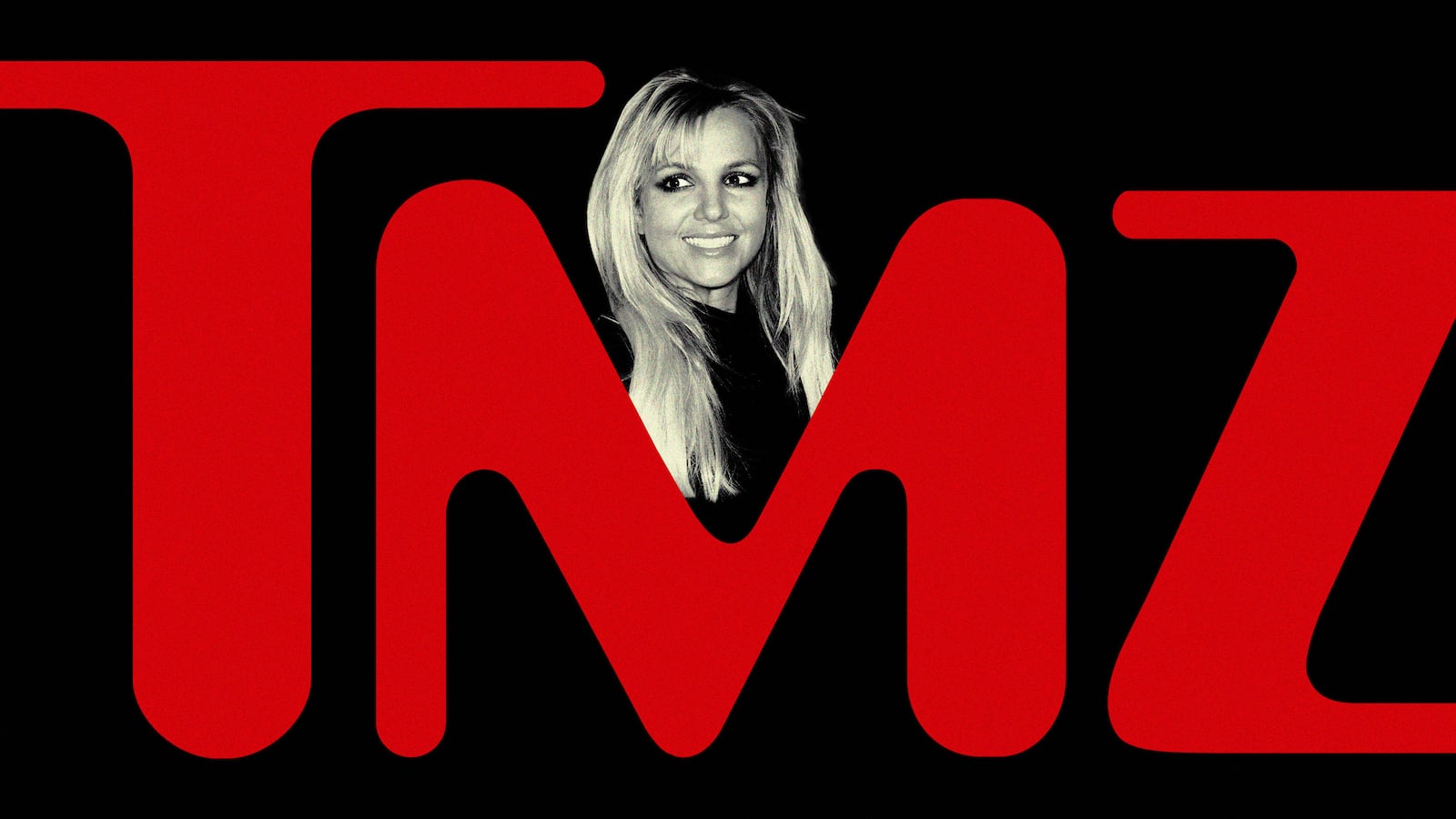In 2007, when a California judge chose to take away Britney Spears’ custody over her two sons, TMZ founder Harvey Levin told the New York Times that Spears needed “a wake-up call.”
“It’s not a frivolous story anymore,” he said. “This is a woman who loves her kids who doesn’t have her kids. It’s now taken tragic elements.”
Levin and the late television producer Jim Paratore co-founded TMZ in 2005. Like pretty much all gossip publications at the time, the scrappy media site made good money covering Spears and meticulously tracked her every movement. The custody incident, New York Times reporter Mireya Navarro wrote at the time, demonstrated that the intense scrutiny surrounding Spears’ erratic behavior had “become a force of its own—one that sells magazines and music, increases Web traffic and gives obscure characters their minutes of fame.”
Based on TMZ’s new “documentary,” Britney Spears: The Price of Freedom, not much has changed. “Britney is Old Faithful” when it comes to traffic, as Levin put it to the Times in 2007, and even after all the learning and growing we’ve supposedly done since then, the business of speculating about her life and well-being is still booming.
The hour-long special, which debuted Monday on Fox and now streams on Hulu, documents “growing signs of trouble” in Spears’ life following the end of her conservatorship. TMZ reports that multiple sources claim Spears “got physical” with her husband, Sam Asghari, on multiple occasions. The program claims that the couple’s marriage is in trouble and that Spears’ “struggles with mental health have worsened.”
Some news sites have already begun to pick up revelations about Spears’ erratic sleep schedule, her alleged habit of “driving aimlessly” around her Los Angeles neighborhood, and more. Never mind that TMZ has published many of these “news” items already as promotional fodder for the special.
These details, all described out of a supposed fear for Spears’ wellbeing, harken back to a time when the singer couldn’t flick a cigarette out of a car without TMZ snapping a photo and publishing a story calling her a “butthead” over it.
TMZ’s The Price of Freedom also notes that the people “caring for” Spears before her conservatorship ended provided a list of recommendations, including that the singer continue therapy. While Spears conceded with a laugh during her June 2021 testimony that she needs “a little therapy,” she also noted that during the conservatorship, she’d been forced to work with therapists she’d never chosen.
TMZ’s special claims that Spears later “mocked” therapy, citing as evidence a video the singer posted on social media in December 2021. The original video included a caption in which Spears wrote that she’d been “forced” to do therapy “10 hours a day, 7 days a week. “[I]n this beautiful nation it would only be fair for me to dedicate my life to skits to the wonderful therapist,” she added.
This context is completely absent from the special. Instead, viewers hear from sources like media personality Dr. Drew Pinsky, who tells us, “Mocking therapy is not a good sign obviously, but it is a brain disorder and it is highly biological and it really requires medication not so much therapy.”
It’s unclear what Pinsky means by “it” here—the supposed brain disorder, perhaps. Spears has not shared any diagnosis publicly, which might be why Britney Spears: The Price of Freedom leans so heavily on the nebulous blanket term “mental illness.”
Later on, Pinsky cites Spears’ behavior on social media as exhibits of a “rapid cycling mental illness.”
“They are not well,” he says. (Again, TMZ provides no context as to who “they” is in this instance.) Pinsky continues: “Their brain isn’t working right. If she evokes anger in you, be careful, because this isn’t about you.”
A dreadful energy is palpable throughout the doc, from the dramatic music to the ominous videos culled from social media of Spears looking into the camera, shouting lyrics to “Row, Row, Row Your Boat,” and dancing in her home.
Last winter, when the New York Post drummed up an article about “former #FreeBritney fans” who are now supposedly “deeply concerned” for the singer, the tabloid seemed to confirm that in some people’s eyes, Spears’ freedom is still provisional. As one source for the Post put it, “Freedom can be very dangerous for someone who has no idea how to navigate life without being controlled.”
Moments like these highlight how Spears’ personal predicament reflects the broader struggles of the disability community. As reporter Sara Luterman —who is autistic and blind—put it in a Slate interview about the conservatorship in 2021, “When people think you’re crazy, nothing you say is believable. Everything can be undermined.”
Maybe that’s why Spears remains so heavily monitored, even after her release from the guardianship arrangement. For instance: TMZ’s doc also makes sure to mention an incident from this January, in which police showed up at Spears’ home for a wellness check. The reason? Fans had begun calling authorities to say she might be in danger based on her recent puzzling behavior at a restaurant and her decision to change her Instagram display name before deleting her account. In the age of social media, even a pop star’s fans can assist in their surveillance; TMZ’s special includes a viral TikTok video of a few fans who apparently filmed themselves while calling the cops.
A statement from Spears after the police visit read in part, “I love and adore my fans but this time things went a little too far and my privacy was invaded. The police never entered my home and when they came to my gate they quickly realized there was no issue and left immediately.”
Perhaps unsurprisingly, the harshest portion of The Price of Freedom impugns Spears’ capability as a mother. Just like the media smeared her as “white trash” and an unfit parent in the past, The Price of Freedom seems determined to do the same, going so far as to use four-year-old videos that Spears’ ex-husband Kevin Federline posted (and then deleted) last summer in a pathetic attempt at mommy-shaming. Federline’s attorney Mark Vincent Kaplan also appears in TMZ’s special as an expert source.
Psychiatrist Charles Sophy—a former medical director for the County of Los Angeles Department of Children and Family Services, whose website also describes him as a “frequent contributor to Dr. Phil”—goes so far as to say that Spears “does not know how to parent, and so she does it in these desperate ways.”
Levin offers his own analysis as well: “The fact is, she has no real reference point on how to be a parent,” he says. “Her dad was mostly absent when she was growing up, and her mom was, well, a classic stage mom. Britney wasn’t a child so much as a commodity.”
It’s ironic, then, that the one optimistic note in The Price of Freedom comes toward the end, as experts (and, for some reason, Paul Anka) discuss the possibility that Spears might one day return to the stage. Are we meant to believe that the same industry that exploited Spears is her best path toward redemption?
For all the discussion in TMZ’s production about how painful Spears’ isolation might be, neither the doc nor its “experts” seem too eager to consider how their own commentary might contribute. Spears spent years unable to tell her story, and although she’s reportedly preparing to release a memoir this fall, it’s hard to escape the sense that others have already defined her narrative (and made good money doing so).
As disappointing as it is to see tabloids continue to scrutinize Spears’ every move, there have been encouraging signs that the public, at least, is less eager to tar and feather her the same way we did in 2007. In addition to Asghari, who has spoken out against the doc, Spears’ fans rallied for a mass social media block against TMZ. (More amusingly, they’ve also begun making fun of some of the over-hyped “reveals,” like Spears’ reported caffeine habit.) Spears might be stronger than yesterday, but she also shouldn’t have to be; what she really deserves is a mere shred of dignity.









